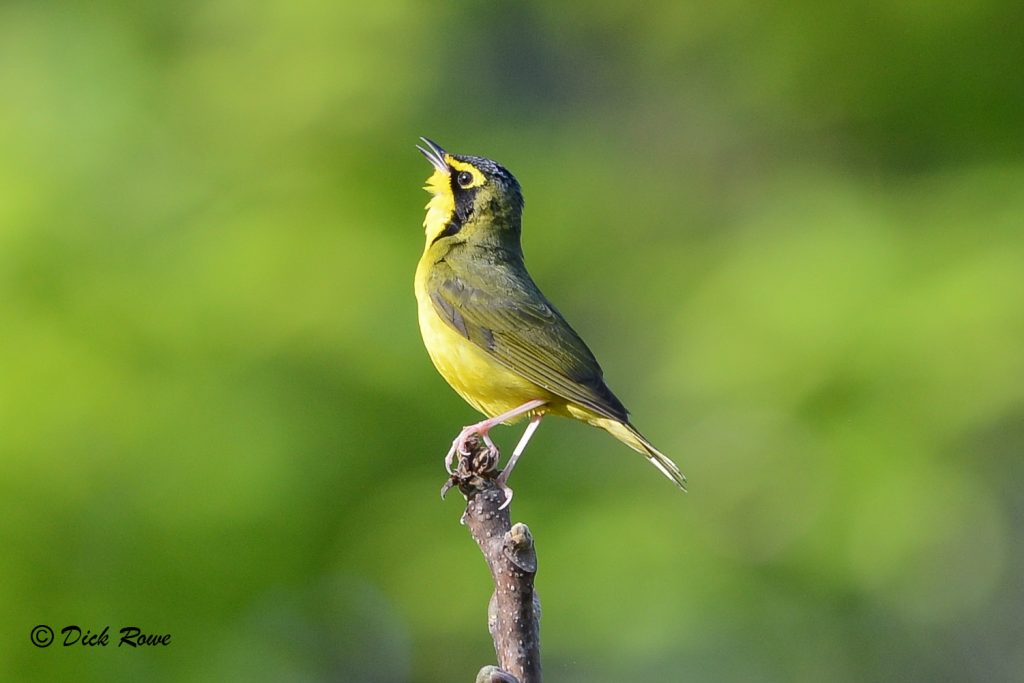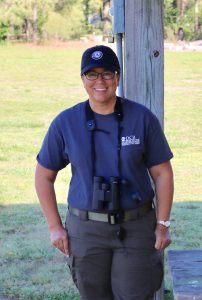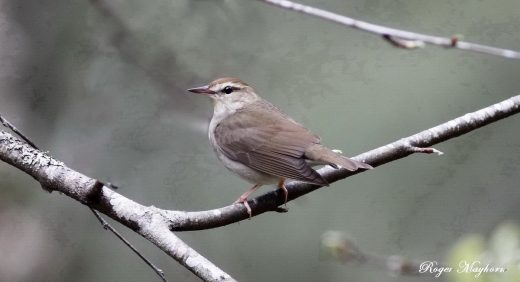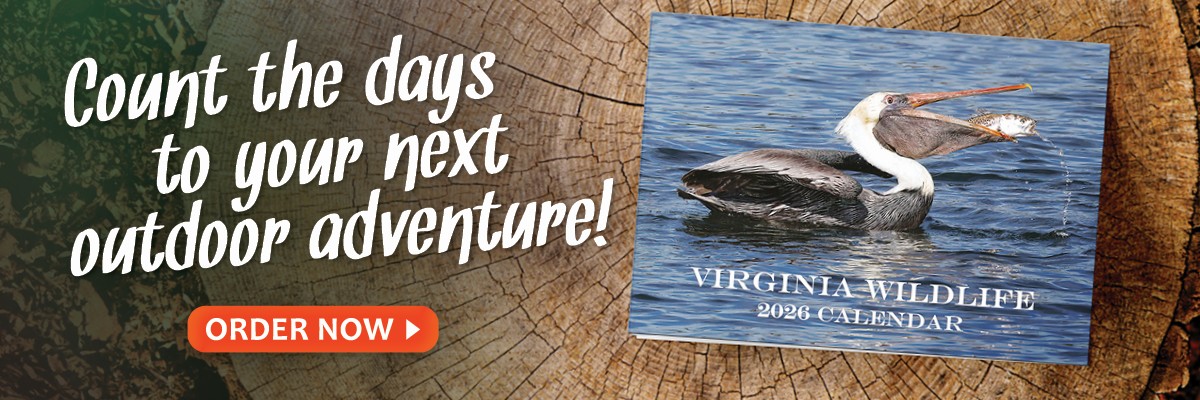By Eric Wallace

Kentucky Warbler (CO Dick Rowe)
Certified master naturalist Kelly Krechmer took a break from her life in Fauquier County to spend the summer atlasing in far southwest Virginia.
In the spring of 2017, certified master naturalist and VABBA2 super-volunteer Kelly Krechmer faced a tough decision. Looking to fill a service position with AmeriCorps, she needed to choose a state park to spend her summer volunteering. Problem was, the list featured a hit-parade of amazing conservation and stewardship programs from around the U.S.
At first, she considered Montana, Maine, and various parks in Virginia. But then she saw there was a slot at Breaks Interstate Park. A resident of Fauquier County, Krechmer, in her early-40s, was already deeply involved with VABBA2 efforts in northern Virginia. When she learned from Atlas director Dr. Ashley Peele that the park and its surrounding areas were drastically under-birded, she didn’t hesitate: Located in far southwest Virginia along the Kentucky border, Breaks would serve as a perfect outpost for attacking hard-to-reach survey blocks in Region 7.
“For years I’d seen pamphlets advertising Breaks as the ‘Grand Canyon of the South’ and had always thought it would be cool to visit” says Krechmer. Formed by the Russell Fork River, the 5-mile-long horseshoe-shaped gorge has a depth of 1,650 feet and is the deepest canyon east of the Mississippi. Volunteering with AmeriCorps while atlasing for the VABBA2 presented the perfect opportunity to explore the BIP’s unique habitats and help with an important avian conservation effort.
Arriving in May, Krechmer lived in the park for four months. As a Certified Interpretative Guide, she led educational programs about birding, eBird, and iNaturalist. She also took park guests on guided hikes and van tours around the area. Meanwhile, staying on-site enabled her to e-bird round the clock for the VABBA2 in one of the state’s most isolated and biologically diverse areas.
“I checked the Atlas map and saw there was a priority block in Dickenson County that fell within the park,” she says. Making it her goal to tackle the block, Krechmer completed 130 checklists, observed 62 avian species, and confirmed nearly 30 of those were breeding. She was one of just five e-birders to visit the area in all of 2017. “I managed to complete the Elkhorn City SE block, which is a priority block, and was happy to be able to accomplish that during my short stay.”
From there, Krechmer spent her free time visiting other Region 7 blocks, nocturnal birding, checking out moths, and focusing on remote VABBA2 locations. Along the way, she visited unique high-elevation southern Appalachian spruce-fir forests and balds, as well as grassland and early-successional habitats that are relatively new to the area. Of these, her favorite was the 290-acre Poplar Gap Park. Located in rural Buchanan County, the park was created in 2001 and sits atop the site of a reclaimed strip-mine.

Kelly Krechmer
“Poplar Gap is special because it hosts uncommon species such as Dickcissel and Northern Bobwhite quail,” says Krechmer.
The spot is also a haven for Eastern Bluebird, Indigo Bunting, and Golden-winged, Kentucky, Black-throated Green, Yellow-throated, Black-and-white, and Hooded Warblers. As the habitat develops, Virginia Department of Wildlife Resources personnel expect avian diversity to rise accordingly. Eventually, there will probably be eastern meadowlarks, red-winged blackbirds, and orchard orioles as well.
Overall, Krechmer says her time in southwest Virginia was “amazing.” It helped her become the VABBA2’s second-most contributing atlaser, with a total of 97 confirmed species, and entries from every county in the state. Despite being a temporary visitor, she remains the foremost contributing atlaser in Buchanan, Dickenson, Tazewell, Wise, Russell, and Lee counties. Nationally, she was recognized as one of just 2,885 birders in the U.S. to complete an average of one Cornell Lab of Ornithology eBird checklist a day, and, completing 2,248 checklists, was the nation’s 24th most active e-birder in 2017.
Although the accolades are great, Krechmer says contributing data to eBird and the VABBA2 to advance conservation initiatives is what matters most. For her, the act is part and parcel of birding on the ground.
At Breaks, Krechmer’s atlasing efforts yielded a plethora of memorable avian encounters — not least of which was a nocturnal altercation between a bobcat and a nesting eastern whip-poor-will. Interestingly, the highlight of her Region 7 adventures came as a happy accident.
“I was out in the park one day and just so happened to record what proved

Swainson’s Warbler (CO Roger Mayhorn)
to be the flight song of a Swainson’s warbler,” she says. Thinking it was neat, she uploaded the file to SoundCloud, and went back to her day-to-day. Then VABBA2 director Ashley Peele reached out, asking permission to submit the rare recording to be considered for inclusion in the Birds of North America archive. Krechmer says the email was both thrilling and validating, and adds it was doubly rewarding to “have so much fun birding and find out the data I collected was so useful.”
Inspired by her experience at Breaks, Krechmer has continued volunteering with AmeriCorps and is currently stationed at Kiptopeke State Park on the Eastern Shore in Virginia. There, in addition to leading interpretive adventures, she keeps busy covering a VABBA2 block in the park. As of May 1, she had already confirmed five breeding species, and expects that number to rise dramatically over the next four months.
“I never thought this would become such a big part of my life, but it has,” says Krechmer. While she always enjoyed being outside and observing nature, over the past decade or so she has become increasingly “passionate about citizen science and engaging and inspiring others —” especially children — “to discover the outdoors and the wonders of birding.”
“I’m out there every day learning,” she says. “I love it and I love trying to get people onboard.”
So much so, in fact, Krechmer is considering going back to school to pursue a degree in ornithology.
We need your help completing blocks in southwest Virginia. Although VABBA2 super-volunteer Kelly Krechmer completed the Elkhorn City SE block while staying in Breaks Interstate Park last summer, she says the CE block, CW block, and many others are in need of atlasing.
To learn more about Region 7 and how you can lend a hand, email regional coordinator Steven Hopp and visit the Atlas website at www.vabba2.org.
To learn more about Krechmer’s birding adventures in Breaks Interstate Park and elsewhere, visit her BLOG.
~Eric Wallace, VABBA2 Communications


